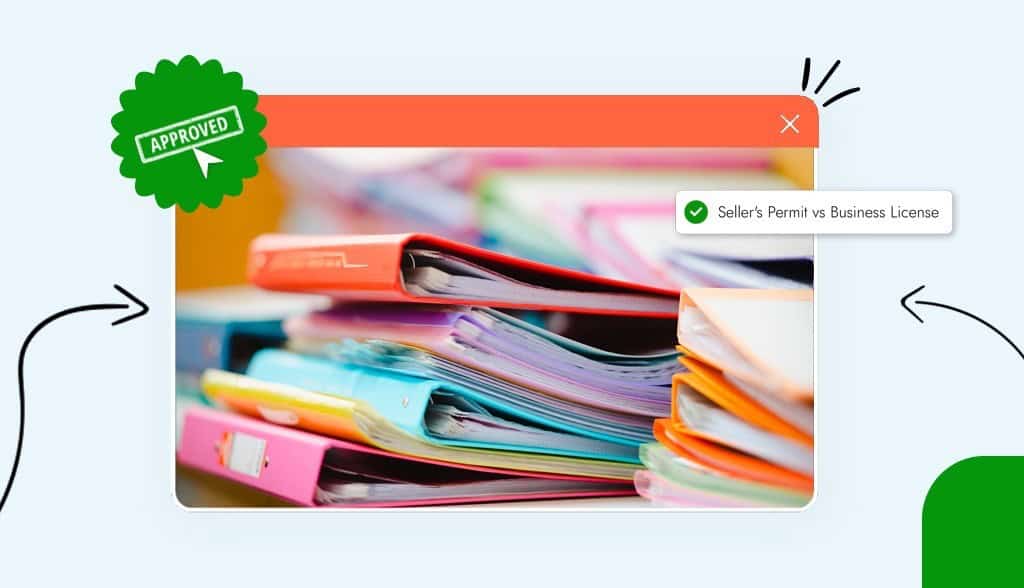Are you reading this because you’re starting a small business and want to know whether you need a seller’s permit or business license?
Or you’ve already begun and need licenses and permits to trade in your location.
Either way, this post is for you if you need clarification on the difference between a business license and a seller’s permit and whether you need one or both.
Business license vs seller’s permit

You’ll often see the terms business license and seller permit used interchangeably, but keep that from fooling you because they are different!
And you must understand the difference to legally run your business in your location (or locations) and avoid fines.
Okay, now you know a seller’s permit and a business license are two different things; let’s learn what they are and when your business needs one or both.
What is a business license?
A business license (or a tax registration certificate) permits you to trade in a specific jurisdiction once you comply with relevant regulations and laws.
Business licenses come in many forms, and which you need depends on your chosen industry; in this post, however, we’re focusing on a general business license.
A general business license is a standard (one-size-fits-all) license that every business needs (regardless of the industry) to operate in their location.
When do you need a business license?
Not all states have a mandatory general business license, but most city and county governments require you to have one to operate your start-up.
Depending on your location, your local or state government might require an annual business license renewal, and the requirements for getting and renewing one can also vary.
To determine your state and local regulations and requirements for a business license, visit your relevant official government website.
How to get a business license:
You get a business license from the relevant state regulatory authorities; for example, in Delaware, you apply using the state’s business portal, OneStop. However, you get one in Alabama from the county office license commissioner.
You apply to local state agencies like the county clerk’s office for county and city business licenses.
What is a seller’s permit?
A seller’s permit (also known as a sales tax license, retail license, sales and use tax permit, vendor’s license, or sales tax permit) is a business license that allows you to collect sales tax on taxable goods and services you sell or lease, including properties if selling regularly.
Seller’s permits are state and (depending on your location) local-specific; once you collect sales tax, you pay it to your state and local tax authorities.
Seller’s permits exist to enable the state you do business in to control the collection, reporting, and paying of sales tax to raise revenues, which they use to fund government services and programs such as healthcare, education, and transportation.
And as sellers’ permits are state-specific, you might need one in every state you do business in.
Each state has specific requirements for which companies need a seller’s permit, but most businesses need one when they make 3 or more sales in 12 months.
Different seller’s permits:
Two types of seller’s permits exist: general and specific.
A general seller’s permit allows you to provide and sell most services and goods in your state, while specific permits limit you to selling certain items.
Where do you need a seller’s license?
Like a business license (more on that later), you need a seller’s license for every location where you do business.
For instance, if you form an LLC California but have a physical store in Florida, you’ll need a seller’s permit in both locations.
And online entrepreneurs selling in multiple states will need one in each place of business.
Some states, however, don’t charge sales tax, so if you start a business in one of those, you won’t need a seller’s license.
States without a sales tax are:
- Alaska.
- Oregon.
- Delaware.
- New Hampshire.
- Montana.
How to get a sales permit:
To get a sales permit, visit your local (or relevant if selling in multiple states) government business regulation agency, often the Department of Revenue, where you’ll find the forms and application requirements.
Most states require the following to get a seller’s permit:
- Your business name and address.
- Your Social Security number (SSN) for sole proprietors or general partnerships.
- Employer identification number (EIN) for legal entities like an LLC or S corporation.
- A monthly sales estimate.
- Names of suppliers (if applicable).
Is there any difference between a seller’s and a reseller’s permits?
The short answer is yes, and you need the correct permit to avoid paying sales tax on the products you’ll resell.
Here’s what you need to know:
- A seller’s permit (also known as ‘sales tax permit’ or ‘sales tax license’) allows you to collect sales tax on specific products or services you sell or provide, which you then pay to your state (and, where relevant) local tax authorities.
- A reseller’s permit (also known as a resale license, resale certificate, or exemption certificate) enables you to buy products from wholesalers and other suppliers without paying sales tax because you are reselling them to customers who pay the relevant sales tax, which you then pay on to your state or local tax authorities.
Conclusion
And there you go, folks, that’s all you need to know regarding the question: seller’s permit vs business license; what’s the Difference?
Here’s a quick recap:
You don’t need a seller’s permit if you don’t sell or provide products or services liable for sales tax.
But odds are (depending on your location) you might need a state business license and require a county or city business license when you start a business. You can also use our LLC service to help you get your business off the ground with liability protection.
Thanks for reading, and I hope my post answers all your question.
FAQ
A seller’s permit enables you to collect sales tax (state, local, or both) on each tax-relevant product or service you provide to your customers, which you then report either monthly, quarterly, or annually (depending on your location’s requirements) and pay to your relevant tax authorities.
No, the IRS issues an EIN or (federal tax ID number), whereas a seller’s permit is a tax ID that your state issues for local tax.
Most businesses need a business license to operate in California, but you only need a seller’s permit if you sell or provide taxable goods or services.
A California seller’s permit is free; however, you might need to pay a security deposit to cover any outstanding taxes if you close your business.
